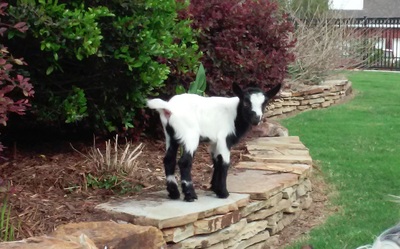Welcome to Hill Country Miniatures. We are a small breeding farm located in Rockwall, Texas, about 30 minutes east of Dallas, Texas. We initially started raising Miniature donkeys in the 1990's but had to sell most of our herd after I had a bout of cancer. We have successfully raised, shown and sold donkeys all over the world. We have donkeys in South Africa, Australia, England, France, Spain, Belgium, and Canada. We have bred numerous national champions, but decided to transfer to animals that need a smaller footprint and are easier to handle. As with the donkeys, we purchased the best bloodlines and animals that we could, because Quality breeds Quality. We spend lots of time with our goats and make sure that they are imprinted at birth, as well as having monthly hoof care, checked for parasites monthly and blood checked for Cae, Cl and Johnes every year. They are routinely exposed to our teenage daughter, our young grandchildren, and surrounded by our boxers, our cats, our donkeys and our chickens, so they are easy to handle.
If you are on our mobile site, please tap on the three bullets on the upper left side of the page to go to our for sale page, our bucks page and our doe page. If you see something that you like that is not for sale, please call me at 214-335-0024 or shoot us a message on our contacts page.
Miniature Silky Fainting Goats Mini Silky Fainters are usually very small goats, averaging 22 to 25" tall. They are very friendly and gentle, and make great pets. They are very rare, with about 11,000 registered at this time. They do not have to faint, but silky, long hair and facial hair is desirable. They should look like mini terriers in appearance. They are mainly used for dairy production and fiber production. There is a strong demand for these goats, so we recommend that you get on our waiting list.
Upkeep: Many people ask about upkeep of the coats on the mini silkeys. They do need a thorough brushing in the spring to get rid of the winter fur. If you want a pet, that is all that is required to keep the coat in shape. To get the show coats is another matter. Show goats must be brushed weekly, conditioned monthly and sprayed with detangler. The goats need regular shots to prevent diseases, worming when they need it and hooves checked and trimmed every two or three months. Most goats do well on a diet of coastal hay or alfalfa. We feed mainly coastal hay free choice, with alfalfa pellets each day for the does. We also mix in black oil sunflower seeds to give them extra oil for their coats. They require minerals and baking soda to be available daily and the boys need aluminum chloride to help them avoid stones. They do not need daily grain, and in fact it is not good for them. We have dog houses scattered about the property and they love to sleep in them and jump on them. We also have a large run in shed to protect them from the elements.
If you are on our mobile site, please tap on the three bullets on the upper left side of the page to go to our for sale page, our bucks page and our doe page. If you see something that you like that is not for sale, please call me at 214-335-0024 or shoot us a message on our contacts page.
Miniature Silky Fainting Goats Mini Silky Fainters are usually very small goats, averaging 22 to 25" tall. They are very friendly and gentle, and make great pets. They are very rare, with about 11,000 registered at this time. They do not have to faint, but silky, long hair and facial hair is desirable. They should look like mini terriers in appearance. They are mainly used for dairy production and fiber production. There is a strong demand for these goats, so we recommend that you get on our waiting list.
Upkeep: Many people ask about upkeep of the coats on the mini silkeys. They do need a thorough brushing in the spring to get rid of the winter fur. If you want a pet, that is all that is required to keep the coat in shape. To get the show coats is another matter. Show goats must be brushed weekly, conditioned monthly and sprayed with detangler. The goats need regular shots to prevent diseases, worming when they need it and hooves checked and trimmed every two or three months. Most goats do well on a diet of coastal hay or alfalfa. We feed mainly coastal hay free choice, with alfalfa pellets each day for the does. We also mix in black oil sunflower seeds to give them extra oil for their coats. They require minerals and baking soda to be available daily and the boys need aluminum chloride to help them avoid stones. They do not need daily grain, and in fact it is not good for them. We have dog houses scattered about the property and they love to sleep in them and jump on them. We also have a large run in shed to protect them from the elements.
